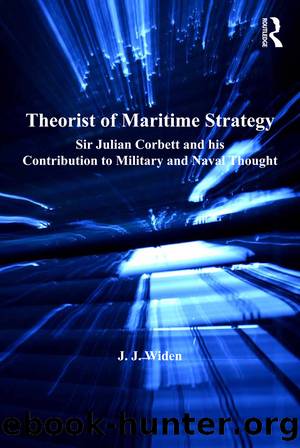Theorist of Maritime Strategy by J.J. Widen

Author:J.J. Widen [Widen, J.J.]
Language: eng
Format: epub
Tags: History, Oceania
ISBN: 9781317010968
Google: 5dCXCwAAQBAJ
Publisher: Routledge
Published: 2016-02-17T16:13:04+00:00
1 Corbett, Some Principles, pp. 16â17 and 85â87. The idea that Corbettâs theory of war primarily can be interpreted as a reaction to the Napoleonic principle of overthrow can be found in Baugh, untitled book review, Naval War College Review, p. 131. This account is a review of the Naval Institute Press edition from 1988 of Corbettâs Some Principles.
2 âLectures on Naval Strategy by Julian S. Corbettâ, CBT/31, Corbett papers, National Maritime Museum, London.
3 Corbett, Some Principles, p. 18.
4 Corbett, Some Principles, p. 18.
5 Corbett, Some Principles, p. 18.
6 Corbett, Some Principles, pp. 20â21.
7 Corbett, Some Principles, pp. 20â21.
8 Corbett, Some Principles, p. 22.
9 Echevarria, Clausewitz and Contemporary War, p. 73.
10 Clausewitz, On War, translation from 1976, p. 605. For a similar interpretation of Clausewitzâs view of war as a continuation of political intercourse, see Robert E. Osgood, Limited War: The Challenge to American Security (Chicago, IL: University of Chicago Press, 1957), pp. 21â23. For an interesting critique of Clausewitzâs âpolitical philosophy of warâ, see Anatol Rapoport, âEditorâs Introductionâ, in Carl von Clausewitz, On War (London: Penguin Classics, 1968), pp. 11â80.
11 This argument can be found in Martin van Creveld, âWhat is Wrong with Clausewitz?â, in Gert de Nooy (ed.), The Clausewitzian Dictum and the Future of Western Military Strategy (The Hague: Kluwer Law International, 1997), pp. 19â20. Quotations are from ibid.
12 For a critical view of Clausewitzâs application of ends and means in war, see van Creveld, âWhat is Wrong with Clausewitz?â, pp. 18â20.
13 The Italian field marshal Raimondo Montecuccoli (1609â1680) was probably one of the first military theorists to use the conceptual distinction between offence and defence. See Gat, A History of Military Thought, pp. 15â26.
14 âLectures on Naval Strategy by Julian S. Corbettâ, in CBT/31, Corbett papers, National Maritime Museum, London. See also Corbett, Some Principles, pp. 31â32. Compare with Clausewitz, On War, translation from 1976, pp. 357â358.
15 Corbett, Some Principles, p. 32. Compare with Clausewitz, On War, translation from 1976, p. 358.
16 Corbett, Some Principles, pp. 32â34.
17 Corbett, âNotes on Strategyâ, p. 329.
18 Corbett, Some Principles, pp. 34â35. Compare with Clausewitz, On War, translation from 1976, pp. 357â358.
19 Corbett, Some Principles, p. 36.
20 Here Corbett is in accord with Castex, a military thinker usually thought of as an exponent of the great value of the offensive in naval warfare. However, Castex argued that in some cases when the defender was able to force the attacker âto come and fight him on known ground where he had prepared positions more solid than those of his moving adversaryâ, the uncertainty usually characterising the defence disappeared and the defender had the advantage of surprise âin the form of counterattacksâ. But this was, according to Castex âan exceptional caseâ and, in general, surprise favoured the attacker. See Raoul Castex, Strategic Theories (Annapolis, MD: Naval Institute Press, 1994), selections translated and edited with an introduction by Eugenia C. Kiesling, p. 313.
21 Found in Heuser, Reading Clausewitz, p. 93.
22 Castex, Strategic Theories, pp. 311â313.
23 Castex, Strategic Theories, p. 322 (emphasis in original).
24 Castex, Strategic Theories, pp.
Download
This site does not store any files on its server. We only index and link to content provided by other sites. Please contact the content providers to delete copyright contents if any and email us, we'll remove relevant links or contents immediately.
The Memory Code by Lynne Kelly(2401)
Schindler's Ark by Thomas Keneally(1884)
Kings Cross by Louis Nowra(1797)
Burke and Wills: The triumph and tragedy of Australia's most famous explorers by Peter Fitzsimons(1427)
The Falklands War by Martin Middlebrook(1384)
1914 by Paul Ham(1345)
Code Breakers by Craig Collie(1252)
A Farewell to Ice: A Report from the Arctic by Peter Wadhams(1248)
Paradise in Chains by Diana Preston(1247)
Burke and Wills by Peter FitzSimons(1238)
Watkin Tench's 1788 by Flannery Tim; Tench Watkin;(1232)
The Secret Cold War by John Blaxland(1213)
The Protest Years by John Blaxland(1205)
THE LUMINARIES by Eleanor Catton(1196)
30 Days in Sydney by Peter Carey(1160)
Lucky 666 by Bob Drury & Tom Clavin(1155)
The Lucky Country by Donald Horne(1140)
The Land Before Avocado by Richard Glover(1119)
Not Just Black and White by Lesley Williams(1085)
